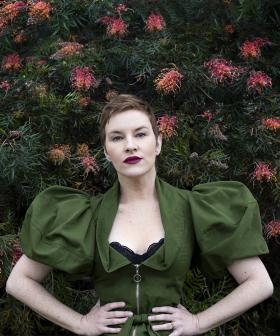
I’m not interested in fitting Mulvany’s life into this plot, even though it’s hard to resist. When we meet someone whose story seems almost impossibly full of grit and glory, we often have to put it into some kind of labelled package to make sense of it all.
‘Everyone loves a peak,’ she says, ‘especially when it’s “the country girl beating cancer” but it’s the 16 hours a day at the desk stuff that they miss out on. Overnight success just doesn’t really exist.’
Kate Mulvany was born in 1978 in Geraldton in Western Australia, the first child of Glenys, a teacher, and Danny, a Vietnam veteran then road builder. Her father’s exposure to Agent Orange caused the renal cancer that she would go on to fight for many years as a child, and it has left her with disability and chronic pain.
She went from Geraldton to Perth for university, Perth to Sydney for a touring play, and then from Sydney to the world. Mulvany has forged a prolific and critically acclaimed career both in front of and behind the curtain and camera.
In between roles on screen, in 2004 she wrote and acted in the autobiographical award-winning play The Seed, which toured nationally and is now being adapted as a feature film. Her partner at that time, the actor Mark Priestley, struggled with his mental health and died by suicide in 2008. The media surrounding the event was unethical and brutal, causing Priestley’s family and Mulvany great pain.
The work she’s been doing in the last decade has seen her mentoring and advocating as well as creating. Her adored adaptations include Jasper Jones, The Harp in the South and Mary Stuart, just to name a recent few. Her portrayal of the complex king in Richard III for Bell Shakespeare blew people’s minds for a female lead.
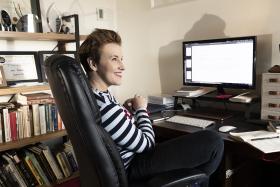
A life such as this appears more Grecian epic than even Homer’s imagination proffered; more drama and tragedy than even Shakespeare would load upon one woman’s shoulders. And as you can see, describing Mulvany’s career as an ‘overnight success’ would also be deeply offensive. The picture that emerges now, after 25 years, is about as diametrically opposed to that cliché as an artist can get.
When she and I met in September at the Marrickville Hotel for wine and potato chips, she described her life these days as one full of love, friendship and hard work. It was the week she officially received both her Order of Australia pin for ‘service to the performing arts’, and the Mona Brand Award for women writers of stage or screen, for ‘a woman who has a body of outstanding work’.
Mulvany’s first ever Shakespeare role was as ‘general wench’ she explains, laughing. She didn’t get into NIDA when she first auditioned, and decades ago when she tried to get an agent she was told she’d ‘never get any work’ because she had a gap between her teeth. Clearly a few people she met on the way up are now kicking themselves for underestimating her.
Most of her career milestones have been accompanied by a profile or interview that points to a ‘breakthrough’ or a ‘breakout’ success. Acting in Baz Luhrmann’s The Great Gatsby in 2013 was a big one. When asked what these profiles often missed, she replies, ‘The hard work gets missed. It’s years and years and years of hard work, and it’s ongoing, and it doesn’t stop. It’s a deep pathway of work, and breaking up with work, and thinking I’m the worst person in the world, and then having success, and it’s all the swings and roundabouts that tend to get overlooked.’
There was something else, too. ‘A lot of the stuff out there is about how accessible I am, in a way, and I don’t feel like that at all,’ she says with a smile. ‘I’m very anxious! I’m not this confident person who writes and acts and gets by day-to-day with a disability.
I don’t want to go on about it, but I can be very fragile.’ In 2018 SBS’s Dateline ran a long story on the ongoing legacy of Agent Orange. ‘I am one of those hundreds of thousands who have dioxin in my system,’ Mulvany wrote when the program aired. ‘A chemical [my dad] breathed in in 1969 affects me every day from the cancer it gave me and the side effects that followed. The Vietnamese still have this poison in their soil and water systems. Their illnesses continue.’
She had been to Vietnam to visit her ‘brothers and sisters of the mist’, meeting with the Vietnamese Association for Victims of Agent Orange. The weeks before she and I spoke her surgeon had just informed her — sternly, by the sounds of it — that she couldn’t keep writing for more than 12 hours at a time. She was being too hard on her body. She needed to slow down a bit, take some breaks.
Reading the coverage of her performance in Richard III without having seen it results in a strong feeling of FOMO. I asked her why she thought that performance in particular had affected people so deeply, and she smiled knowingly. ‘I can only say from the outside that I was being the most truthful I’ve ever been, while strangely, playing a character that is the most removed from me. He and I are practically identical in terms of our spines but, I hope, about as different as you can possibly get in terms of characters. But somewhere in the middle there, away from the maniacal king there was something … I just get him. I love him. He wasn’t the villain that Shakespeare presented him as.’
She talks a bit about how people aren’t born monsters. About how when she read that an analysis of Richard’s bones revealed his diet in the months leading to his death was purely red wine, that she saw something in him. ‘I understood that. If I didn’t have my pain medication that would be my diet, too. I read that and I just thought, Oh Richard.’ Onstage as Richard was the first time she hadn’t had to hide or disguise the way she really walked and the way her disabled body moved through space.
Mulvany wears her father’s wedding ring as her own. ‘Mum gave it to me on the closing night of Richard III,’ she tells me and then shares stories about it and him. The jeweller she took it to for adjustment said of the ‘humble’ nine carat band, ‘Whatever your dad did, he must have been a hard worker, because it is perfectly bevelled all the way around.’
Mulvany has wonderful memories of being woken up in the wee hours of the morning before school to go fishing for crays with him. When he passed away in 2017 after a protracted and painful oesophageal cancer, one of the final things he said to her was ‘Promise me you’ll stop working so hard.’ She reflects now, ‘That was a beautiful thing for him to say because it meant I was getting acknowledged by a man who never took a sick day in his entire life.’
Grief is not something that arrives and leaves, but something she lives with. ‘With my dad and with Mark, both suffered mental illness, and when there is a love that comes through that it’s a tough love, it’s a hard-earned love, it’s a scarred and fibrous love. And I still get moments of deep grief and anger, because I love them so much. Dad is a bit of a totem to me. To wear his ring is a bit like wearing Wonder Woman’s cuffs.’
That wedding ring marks her partnership with Hamish Michael. They have two cats, much laughter, matching pyjamas, and wed in New York in 2015 where they were living at the time. He was the one who pushed her to film an audition tape for Hunters and who told her, with absolute certainty as they sent it off, ‘You’re gonna get this.’ The two met in 2008 while Mulvany was still, in her own words, ‘in love with a dead man’ as she mourned Priestley. ‘I would never say somebody “saved me”, but Hamish came and lifted me up. We help each other, up and out of things.’
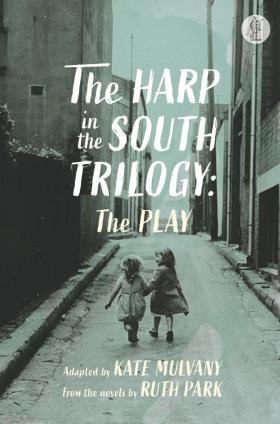
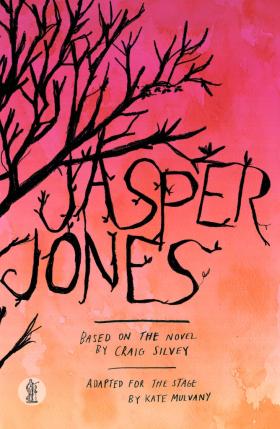
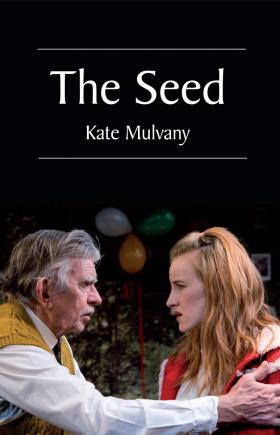
Another side effect of her childhood cancer is that Mulvany can’t have children of her own. ‘It was really terrible for a while to know that, but the terrible thing was to know that it was someone else — a government — who had made that choice about my body.’ I asked her if she thought she would have been able to achieve so much if she had kids, and she replied simply, ‘There is no way.’
This leads to an incredible consideration of legacy and impact. ‘What I want, when I toddle off … I want to be able to be, to a multitude of artists, what others were to me … I think it’s our duty to pass on the baton. I can’t have kids and so the only legacy I’m going to leave behind is my stories. And I want to leave a good legacy. My plays are my children.’
In this way she also sets the bar exceptionally high for the fierce championing and fostering of emerging voices. Mulvany’s modus operandi eviscerates the myth that there’s only so much room ‘at the top’, especially for women. ‘I’m mentoring this amazing playwright from Adelaide named Jamila Main at the moment, and they sent me their Vimeo of a reading they’d done of one of their first plays, and I was a mess! An absolute mess! It was every kind of joy and happiness and excitement from watching that video.’
Australia has an uneasy relationship with the arts, and the pandemic has revealed a deep-seated scepticism about the value of creativity and creatives. The image of ‘bludgers’ is one that infuriates Mulvany, for obvious reasons. ‘I don’t think I’ll ever get over the things that I read, and the comments from people, using the old ‘bunch of bludgers’ trope when we were asking for support while everyone was settling into their Netflix shows and reading their books and listening to their podcasts.’
It’s as though creativity is being held up in opposition to ‘real’ work, or some idea of a ‘True Blue Australia’. ‘It was quite astounding to me that even when Scott Morrison did get up and show any support to the arts,’ Mulvany said, ‘he’d always throw in the line about there being tradies in the arts. You don’t have to be embarrassed by the rest of us!’
This isn’t a new phenomenon, though. She says that in her days at university the creative arts and acting students were told ‘from Day 1’ that they’d never have to pay back their HECS debt because they’d never get jobs. ‘Then if you ever do get offered a job it’s like you have to say yes because you may never get work again.’
It is possible that the name Kate Mulvany is, essentially, an antonym for ‘bludger’. Hers has been no comfortable start nor cushy ride. There is great pain, both physical and emotional, and she grapples with ‘the loneliness of being a writer that no one ever really talks about. Even when you’ve got people around you and I have a beautiful partner and cats and great friends and family, but you’re still very alone in it all.’
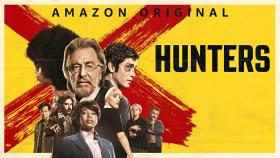
Like most fabled ‘overnight’ successes, Mulvany’s achievements represent a gradual accumulation of skill and effort, something far more meaningful and much more hard-won. ‘I don’t think I’ve “made it” in any way, shape or form,’ she says. ‘I’ve done some good stuff, but I’m always asking, what can be better? What’s next?’
So what is next? She’s just confirmed a role in Baz Luhrman’s next film, the Elvis Presley biopic, which was due to start filming right before Covid-19 hit and will now likely resume some time in 2021. ‘I am portraying Marion Keisker who ran Sun Studios in Memphis alongside Sam Phillips and she was the first person to record Elvis Presley.’ And Hunters has just been confirmed for a second season, which means another big trip to New York for filming next year.
The big thing she’s had on the burner during lockdown is a playwriting commission for one of Australia’s major theatres. It has been all hush-hush until now! Kate's adaptation of Playing Beatie Bow — another Ruth Park classic — will open at the Sydney Theatre Company in February 2021.
And if you read anything about ‘breakthroughs’ or use the word ‘overnight’, you can picture her laughing with glass of wine in hand after another 12-hour day, with that little gap in her teeth.
Bri Lee is the author of the award-winning Eggshell Skull and the essay Beauty. She hosts the monthly B List book club at the State Library of NSW.
The Mona Brand Award is supported by the State Library Foundation.
This story appears in Openbook Summer 2020.
